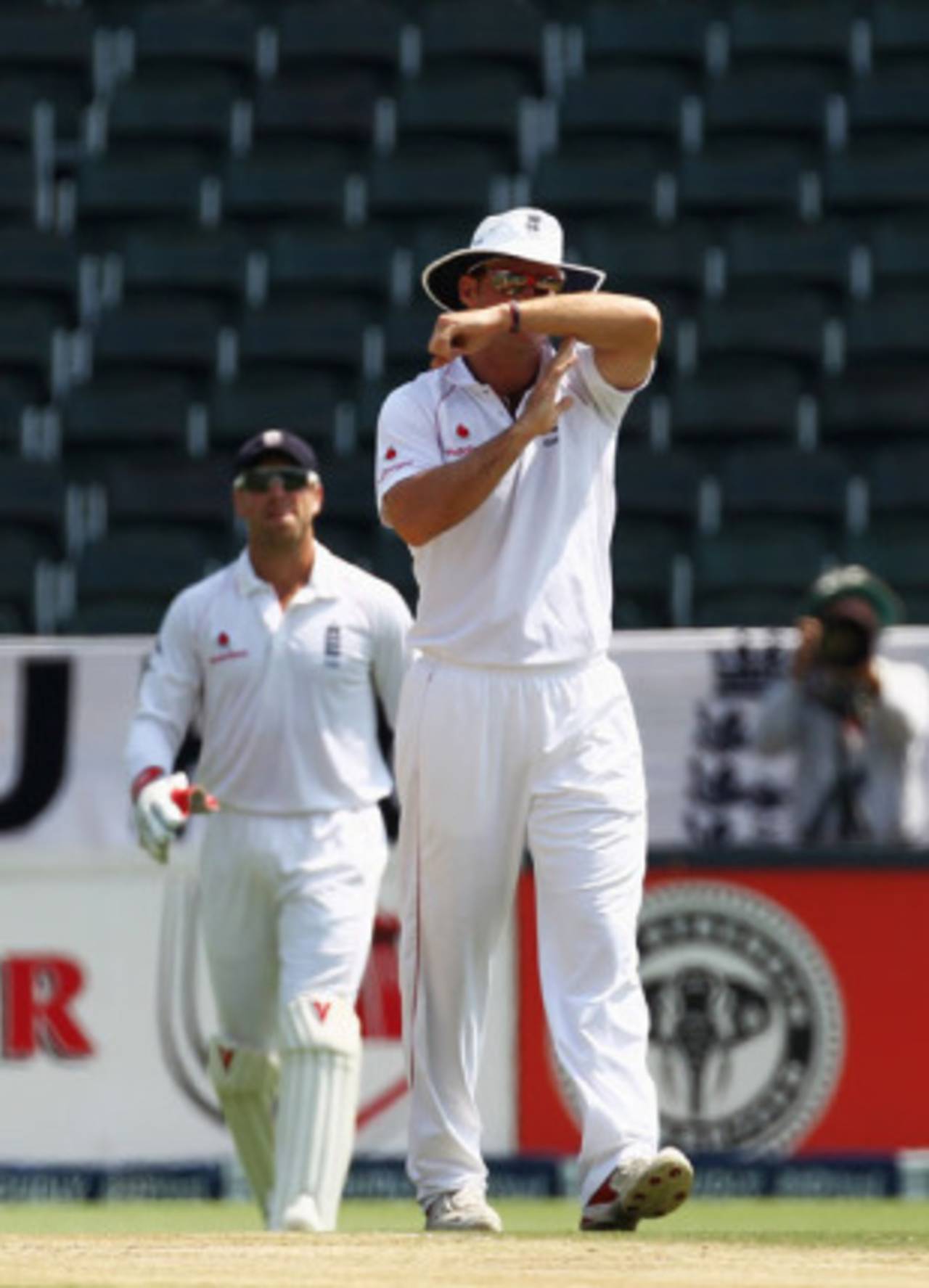ECB stand reflects opposition to UDRS
It's the lack of technology that should be the crux of any further debate, not the gaining back of a lost review
Andrew McGlashan in Johannesburg
Jan 16, 2010, 3:25 PM

The ECB has made its displeasure against the UDRS clear with its latest stand • Getty Images
The dark clouds that have surrounded the Wanderers each afternoon of this Test are not the only storms brewing in Johannesburg but, unlike the thunder showers, the latest controversy over the review system won't disappear in a matter of minutes. England have created more than a few rumbles after escalating their anger at Graeme Smith's reprieve on the second day by asking the ICC to reinstate the lost review.
While England's frustrations at seeing Smith survive and score a hundred are understandable, trying to gain compensation makes them out to be desperate. It would set an impossible precedent if the ICC were to grant England an extra review, especially with so much time having elapsed since the incident. Umpiring errors have never been corrected in retrospect and this, for all the controversy involved, is just another of those. What has irked England the most, however, is a belief that pre-series agreements haven't been adhered to.
The ICC, unsurprisingly, have defended Daryl Harper's role in the whole affair, but if he really did just forget to turn up the volume on his TV set then there is no defence. But the ECB knew it couldn't go in all guns blazing against Harper - outright criticism of an umpire just isn't cricket - so it has had to find another route to make its displeasure clear.
The ECB needs to be careful how they handle this whole affair because technology in decision-making isn't going away. They don't want to be alienated and besides, it isn't as though England haven't benefited in this series. Without a review, Paul Collingwood would have fallen to the first ball in the second innings in Cape Town, and England would have lost the Test - and maybe even the series.
Yet, there is a strong feeling they would quite happily do away with the whole system, having been the one board opposed to its implementation in the first place. "Until the technology is applied correctly we are better off with our oldest method," said Giles Clarke, the ECB chairman. "If the umpire is as deaf as a post and as blind as a bat at least it's the same for both sides."
Such is the ECB's anger that Clarke may try and convince the two touring teams that England face in the summer - Bangladesh and Pakistan - to shelve the review system. India, even though they voted in favour of it, set a precedent when they didn't use reviews for the recent Test series against Sri Lanka.
Amid all the rancour, however, it is worth remembering that even if Harper had heard a noise there is no guarantee he would have reversed Smith's decision. Without Hotspot and the Snickometer, edges are very difficult to rule on - although the noise on the Smith replay was loud and at the precise moment that ball passed bat.
It's the lack of technology that should be the crux of any further debate, not the gaining back of a lost review. That has been and gone. The only way the system could be tweaked in the future would be to adapt it such that, if a bowling side asks for a review and the replays show a no-ball was missed, therefore rendering the review null and void, they won't lose one off their quota. That is something that can happen in the instant of an appeal, not a day later.
In truth, a situation like this has been on the cards. The ECB has never been a fan of the review system, mainly because it doesn't like the players being in control of questioning the umpires' decision.
In truth, a situation like this has been on the cards. The ECB has never been a fan of the review system, mainly because it doesn't like the players being in control of questioning the umpires' decision. Speaking at the Wanderers, Clarke was at pains to say how he felt it impacted the basic fabric of the game - that the umpire's decision is final - and expressed his concerns about the effects at lower-levels in club and children's cricket with players replicating what they saw at international level.
Yet there has always been questioning of umpiring decisions, and one impact of the UDRS has actually been a reduction in the levels of dissent. If anything, the system is improving player behaviour which was one of the aims the ICC was hoping to achieve. However, Clarke has already made his displeasure of this "blasted system" known at "the highest levels" of the ICC, and the matter will be on the agenda for the next meeting in February. But having lost out 9-1 in the original vote, there is little hope of him being able to changing many minds.
And rightly so, because the system has shown it can work. It's a point worth emphasising because, in light of all the recent events, that simple fact appears to have been forgotten. But what the last 48 hours has reiterated is there can't be a half-way house where the use of technology is concerned, and that is where the ICC must take a leading role. Clarke confirmed that Hotspot will be used during the English season, but it remains unclear how many aids will be available for England's next Test series against Bangladesh in March. This issue won't be dying away any time soon. The ECB will make sure of that.
Andrew McGlashan is assistant editor of Cricinfo